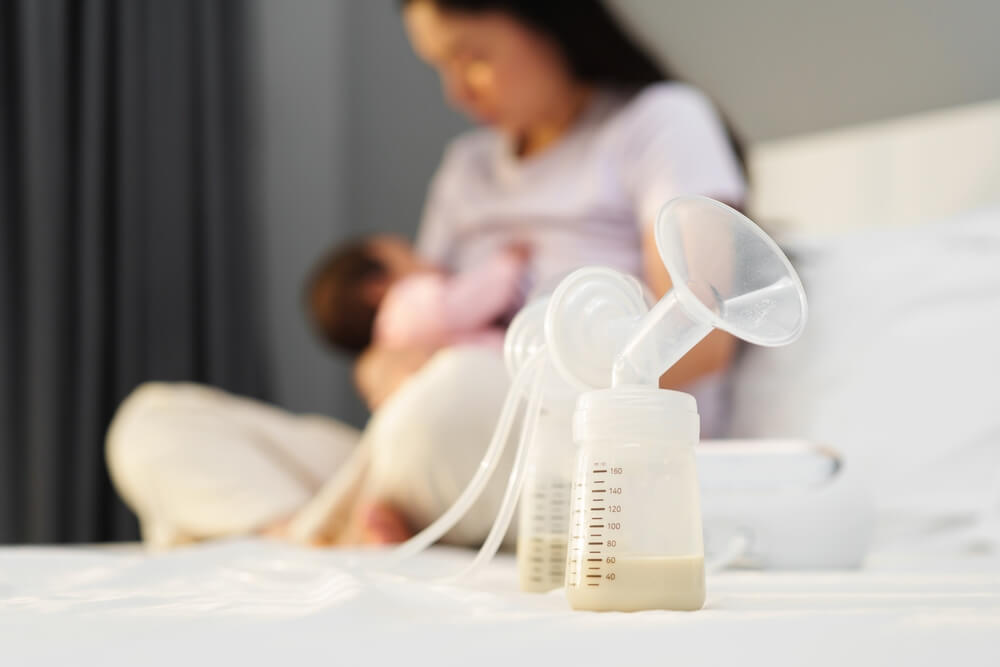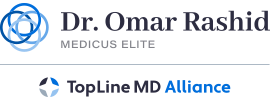Breast cancer is a significant health concern affecting millions of women worldwide. While certain risk factors, such as genetics and age, are beyond our control, adopting healthy habits can play a crucial role in reducing the risk of breast cancer. In this blog post, Dr. Omar Rashid and his ex[ert team will explore various ways to prevent breast cancer and lead a lifestyle that promotes overall well-being.
Embrace a Nutrient-Rich Diet

Our dietary choices play a pivotal role in shaping our health, and when it comes to breast cancer prevention, embracing a nutrient-rich diet becomes a cornerstone. A diet abundant in a diverse range of wholesome foods not only nourishes the body but also provides it with essential elements that bolster its natural defenses against cancer. Let’s delve deeper into why and how a nutrient-rich diet can be a potent ally in the fight against breast cancer.
Diverse Nutrients for Comprehensive Health
A nutrient-rich diet is characterized by a diverse array of foods that supply the body with a wide spectrum of essential vitamins, minerals, and other bioactive compounds. Fruits and vegetables, whole grains, and lean proteins form the foundation of such a diet. These foods bring an assortment of nutrients that collectively contribute to optimal health.
Antioxidants as Cancer Fighters
Fruits and vegetables are particularly rich in antioxidants, compounds that play a crucial role in neutralizing free radicals in the body. Free radicals are unstable molecules that can damage cells and contribute to the development of cancer. Antioxidants, found in abundance in colorful fruits like berries, and vegetables like broccoli and tomatoes, act as a defense mechanism, preventing cellular damage that could potentially lead to breast cancer.
Phytochemicals: Nature’s Anti-Cancer Agents
Delving deeper into the protective properties of certain foods, phytochemicals emerge as key players in the prevention of breast cancer. Phytochemicals are naturally occurring compounds in plants that have been studied extensively for their anti-cancer properties. Broccoli, for example, contains sulforaphane, a phytochemical with demonstrated anti-cancer effects. Berries are rich in flavonoids, another group of phytochemicals known for their antioxidant and anti-inflammatory properties. Tomatoes boast lycopene, a potent phytochemical associated with a reduced risk of breast cancer.
Strategies for Breast Cancer Prevention Through Nutrition
To actively prevent breast cancer, individuals should focus on incorporating a variety of nutrient-rich foods into their daily meals. This includes:
- Colorful Fruits and Vegetables: Aim to consume a rainbow of fruits and vegetables to ensure a broad spectrum of nutrients and phytochemicals. Berries, leafy greens, carrots, and bell peppers are excellent choices.
- Whole Grains: Choose whole grains such as brown rice, quinoa, and whole wheat, which provide fiber, vitamins, and minerals that contribute to overall health.
- Lean Proteins: Include sources of lean protein in your diet, such as poultry, fish, tofu, and legumes. These provide essential amino acids necessary for various bodily functions.
- Moderation in Red and Processed Meats: Limit intake of red and processed meats, as studies have suggested an association between high consumption of these meats and an increased risk of breast cancer.
- Hydration: Stay well-hydrated with water and limit the intake of sugary drinks, which may contribute to weight gain and influence breast cancer risk.
Maintain a Healthy Weight
Excess body weight, especially after menopause, is associated with an increased risk of breast cancer. Engage in regular physical activity and adopt a balanced diet to achieve and maintain a healthy weight. Regular exercise not only helps control weight but also has direct benefits in reducing the risk of breast cancer.
Incorporate at least 150 minutes of moderate-intensity exercise or 75 minutes of vigorous-intensity exercise per week. Activities like brisk walking, jogging, swimming, or cycling can contribute to overall health and significantly decrease the risk of breast cancer.
Limit Alcohol Consumption
The association between alcohol consumption and an elevated risk of breast cancer is a well-established and researched connection. Numerous studies have consistently demonstrated that even moderate alcohol intake can contribute to an increased likelihood of developing breast cancer. To empower women in their efforts to prevent breast cancer, it is crucial to comprehend the specifics of this link and implement measures to limit alcohol consumption.
The Scientific Connection
Researchers have identified several ways in which alcohol may influence breast cancer risk. Alcohol is known to raise estrogen levels in the body, and increased estrogen exposure has been linked to the development of certain types of breast cancer. Moreover, alcohol may impair the body’s ability to metabolize and process other carcinogens, further heightening the risk.
Guidelines for Moderation
While complete abstinence from alcohol is an option, many women may choose to include moderate drinking in their lifestyle. In this context, moderation is key. Health organizations, including the American Cancer Society, recommend that women limit their alcohol intake to one standard drink per day. This equates to approximately 5 ounces of wine, 12 ounces of beer, or 1.5 ounces of distilled spirits.
Understanding what constitutes a standard drink is vital, as it allows individuals to make informed choices about their alcohol consumption. Monitoring and limiting the number of drinks consumed per day can significantly contribute to reducing the associated breast cancer risk.
Positive Impact on Overall Health
Reducing alcohol consumption doesn’t just serve to lower the risk of breast cancer; it also has broader positive effects on overall health. Alcohol is associated with various health issues, including liver disease, cardiovascular problems, and an increased risk of accidents and injuries. By limiting alcohol intake, individuals can actively promote their general well-being and mitigate the risk of various health complications.
Quit Smoking
Smoking is a well-established risk factor for various cancers, including breast cancer. If you smoke, quitting is one of the most effective ways to prevent breast cancer and improve overall health. Seek support from friends, family, or a smoking cessation program to quit smoking and reduce your risk of breast cancer successfully.
Breastfeed, If Possible

For mothers, breastfeeding can offer protective benefits against breast cancer. Breastfeeding has been associated with a lower risk of developing both premenopausal and postmenopausal breast cancer. If possible, aim to breastfeed your baby for at least several months, as it not only provides health benefits for the infant but also contributes to the mother’s long-term well-being.
Regular Breast Exams and Screenings
Early detection is key in the fight against breast cancer. Perform regular breast self-exams to become familiar with the normal appearance and feel of your breasts. Report any changes or abnormalities to your healthcare provider promptly.
Additionally, schedule regular mammograms as recommended by your healthcare provider. Mammograms can detect breast cancer at an early stage when treatment is often more effective. Routine screenings are crucial for women, especially as they age, to monitor and reduce the risk of breast cancer.
The Key: Living a Healthy Lifestyle
Reducing the risk of breast cancer involves adopting a holistic approach to a healthy lifestyle. By incorporating these strategies – maintaining a nutrient-rich diet, achieving and maintaining a healthy weight, limiting alcohol consumption, quitting smoking, breastfeeding if possible, and undergoing regular breast exams and screenings – women can actively work towards preventing breast cancer and promoting overall well-being.
It’s important to consult with healthcare professionals for personalized advice and guidance based on individual health needs. Empower yourself with knowledge and take proactive steps towards a healthier life, significantly reducing the risk of breast cancer and enhancing your overall quality of life.


